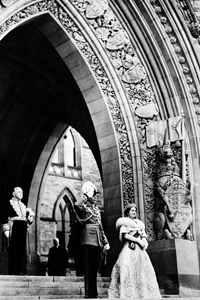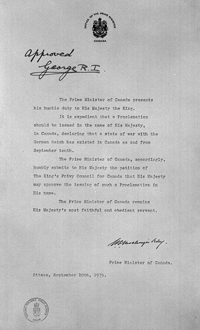Political Life of William Lyon Mackenzie King
Laurier House National Historic Site

"King of Canada" True Comics #12 May 1942.
© Gruner & JAHR USA Publishing / Library and Archives Canada
Mackenzie King's political career is one of the most extraordinary in Canada's history. He had no charisma and never gained the affection of the Canadian public. As a public speaker he was wooden and uninspiring. As a leader, he seemed indecisive. Yet, he was Canada's longest serving prime minister with a record of achievements rivalled only by Laurier and Sir John A. Macdonald.
As a young man, King was an expert in labour studies and industrial working conditions at a time when Canada was rapidly becoming an industrialised nation. In 1900, he was hired to work in the new federal Department of Labour where he attracted the attention of Prime Minister Laurier who promoted him to the top civil service position in the department, as Deputy Minister. In 1908 he entered politics and having won a seat in the House of Commons, was chosen by Laurier to become the Minister of Labour. This was the beginning of a long-term and close relationship between the two men.
The election of 1911 was a disaster for Laurier's Liberal party and for King who lost his seat in the House of Commons. The party remained in the political wilderness for the rest of the decade and its unity was severely challenged because of a sharp split within its ranks over conscription, which Laurier and a group of Quebec Liberals were almost alone in opposing. King, however, remained loyal to his old friend. When Laurier died in 1919, the party chose King as their new leader. In 1921, he led the Liberals to victory in the general election. King became prime minister, an office that he held for twenty-two years between 1921 and 1948, when he retired.
King and the British Empire

H.M. King George VI and Queen Elizabeth leaving the Parliament Buildings after giving Royal Assent to Bills in the Senate Chamber; Rt. Hon. W.L. Mackenzie King in the background, 1939.
© National Film Board of Canada. Photothèque / Library and Archives Canada / C-017440
In his early years in office King had to devote considerable energy to rebuilding the unity of the Liberal party which had fragmented over the conscription issue. The success of his efforts gave him the strong base of support that he needed to stay in office for so many years. Another major accomplishment in the 1920s was to bring about a significant shift in Canada's relations with Great Britain. Like Laurier, King supported the Empire but believed that Canada should be in control of its own affairs. His resistance to outside interference finally resulted in Britain's recognition that Canada was autonomous in domestic and external affairs while remaining as a community within the British Empire. The picture that King had in his mind of what he wanted to achieve as prime minister closely resembled what his predecessor, Laurier, had envisioned: a united, autonomous and prosperous country.
King: The Wartime Leader

Roosevelt and King opening The 1000 Islands International Bridge 1938
© Library and Archives Canada / C-090217
At no time were King's leadership skills more apparent than when he faced the challenge of leading the country through the Second World War. Under King, Canada became a modern industrial nation in the fullest sense, making a contribution to the war effort that taxed the country's resources to the limit. Because of the scale of Canada's involvement in the war, King was able to demand a larger voice for his country in international affairs. This level of influence was particularly obvious in the growing connection between Canada and the United States, a result of the close relationship that developed between King and President Roosevelt. The issue of conscription during the First World War had divided the country and the Liberal Party. King's handling of the issue was masterly and he achieved his goal of full Canadian participation in the war effort without splitting the nation.

Declaration of War against German Third Reich, September 10 1939.
© Library and Archives Canada / c-140955
1939 to 1945 and the years of reconstruction that followed changed Canada. For the average Canadian, the King legacy that has affected them most was the beginning of the welfare state, a new concept for Canadians, that meant the irrevocable enlargement of the role of government in their everyday lives.
It is a testimony to King's accomplishments that, when he retired from office in 1948 he passed on to his successor, Louis St. Laurent, a united country with a solid foundation for future growth.
- Date modified :